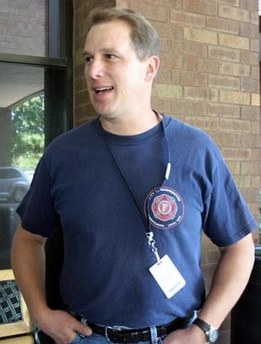
Brownie's gone, but the buck stops here. AP photo.

Hope in a Darkening Age... news, comment, arts, ecology, wisdom, obsessions, the past, the future... "THE END OF ALL INTELLIGENT ANALYSIS IS TO CLEAR THE WAY FOR SYNTHESIS."--H.G. Wells. "It's always a leap into the unknown future to write anything."--Margaret Atwood "Be kind, be useful, be fearless."--President Barack Obama.
Civilization may be nothing more and nothing less than a society’s commitment to particular values, reflected in its philosophies, institutions and actions, continually renewed and extended. It is finally expressed and confirmed by individual citizens and their associations.
The world saw our civilization break down in the Katrina zone, and we saw that, contrary to recent rhetoric, the failure of government can be catastrophic. But civilization reasserted itself, based on a principal civic value, which can’t be expressed any better than in the phrase, “you’d do the same for me.”
I’ve been thinking about this phrase for more than a decade, since the afternoon when it was uttered to me by a black man in his sixties, working as a custodian in a neighborhood coffee bar. When he retrieved and returned the pen I had just dropped, and I thanked him, all he said was: “You’d do the same for me.” He said it with a casual gravity, as though it was something he said regularly, but it also had the quality and weight of a personal mantra of some importance.
It wasn't the first time I'd heard it of course, but this time it hit me differently, mostly because of who said it to me and the sound of his voice. Gradually I realized what an important statement it is. It sums up entire philosophies and puts many book-length ethical treatises to shame. "You'd do the same for me" is nothing less than the basis of civil behavior, from courtesy to heroism.
By saying it to me, moreover, this man was stating both his own moral standard and his faith that others share it in the delicate informal system of day-to-day civilization. In the direct matter-of-factness of this statement, in its earnest assumptions, he was educating me and challenging me to rise to this standard. It is in some ways an ultimate equality, and a testament of faith in human possibility and the human heart.
It’s been said in much more trying circumstances: by fireman in the aftermath of 9/11, explaining why he was starting a 24-hour shift digging through the rubble of the World Trade Center to search for fellow firefighters buried there. They were his brothers, he said, and “they’d do the same for me.”
But it doesn’t require words: every act, every bottle of water a stranger hands to a survivor, every home opened to dazed and displaced relatives, every dollar donated to relief funds, says these words implicitly.
It’s the basis of hospitality and sharing in time of trouble that characterize traditional cultures all over the world. It is more subtle than the Golden Rule, for it carries expectation as well as personal responsibility. “You’d do the same for me” is a challenge in the form of a statement of faith.
Compassion and altruism often depend on empathy, which in turn depends on imagining ourselves in the circumstance of another. This is easier for some than for others. While “You’d do the same for me” reflects an ethic based on empathy, it doesn’t require it. It combines a feeling of human kinship with a utilitarian deduction: we can’t guarantee we will be helped in time of trouble, but if we support an ethic of helping others by our actions, our chances will be better.
In a complex society, individual freedoms and opportunities depend on a shared sense that in the final analysis, we’re all in this together. “You’d do the same for me” is the basic bargain of civilization, the confirmation of the faith in each other and in our institutions necessary to make it all work.








Cronyism Trumps Governance
from an article
by Sidney Blumenthal, in salon [excerpts, with emphasis added:]
The Bush administration's mishandling of Hurricane Katrina stands as the pluperfect case study of the Republican Party's theory and practice of government. For decades conservatives have funded think tanks, filled libraries and conducted political campaigns to promote the idea of limited government. Now, in New Orleans, the theory has been tested. The floodwaters have rolled over the rhetoric.
Under Bush, government has been "limited" only in certain weak spots, like levees, while in other spots it has vastly expanded into a behemoth subsisting on the greatest deficit spending in our history. State and local governments have not been empowered, but rendered impotent, in the face of circumstances beyond their means in which they have desperately requested federal intervention. Experienced professionals in government have been forced out, tried-and-true policies discarded, expert research ignored, and cronies elevated to senior management.
Before Katrina, the Republican theory received its most apposite formulation by a prominent lobbyist and close advisor to House Majority Leader Tom DeLay, Grover Norquist, who said about government that he wanted to "drown it in the bathtub." In relation to the waters that surround it, New Orleans has been described as a bathtub, and it has served as the bathtub for Norquist's wish.
Only two people in the light of recent events have had the daring to articulate a defense of the Republican idea of government. House Speaker Dennis Hastert, asked about rebuilding New Orleans, volunteered: "It doesn't make sense to me." He elaborated: "I think federal insurance and everything that goes along with it ... we ought to take a second look at that."
The second defender was Michael Brown, director of the Federal Emergency Management Agency…,. On Sept. 1, Brown stated: "Considering the dire circumstances that we have in New Orleans, virtually a city that has been destroyed, things are going relatively well."
Even as the floodwaters poured into New Orleans, unimpeded by any federal effort to stanch the flow, the White House mustered a tightly coordinated rapid response of political damage control. Karl Rove assumed emergency management powers. The strategy was to dampen any criticism of the president, rally the Republican base, and cast blame on the mayor of New Orleans and governor of Louisiana, both Democrats. It was a classic Bush ploy against the backdrop of crisis. The object was to polarize the nation along partisan lines as swiftly as possible. While policy collapsed, politics reigned. Once again, Bush the divider, not the uniter, emerged.
Yet others operated off-message, casting aspersions on the hurricane's victims. The president's mother, Barbara Bush, interviewed on American Public Media's "Marketplace" program," said of the displaced from Louisiana who are temporarily housed in Houston's Astrodome, "What I'm hearing, which is sort of scary, is they all want to stay in Texas. Everyone is so overwhelmed by the hospitality. And so many of the people in the arena here, you know, were underprivileged anyway, so this -- this is working very well for them."
And Sen. Rick Santorum, R-Pa., suggested that the residents of New Orleans who failed to escape the flood should be punished. "I mean, you have people who don't heed those warnings and then put people at risk as a result of not heeding those warnings. There may be a need to look at tougher penalties on those who decide to ride it out and understand that there are consequences to not leaving."
The White House sought to turn back the rising tide of anger among blacks by deputizing Secretary of State Condoleezza Rice. A week after the hurricane, Rice mounted the pulpit at a black church in Whistler, Ala. "The Lord Jesus Christ is going to come on time," she preached, "if we just wait."
An anatomy of cronyism
President Clinton appointed James Lee Witt as the [FEMA] director, the first one ever to have had experience in the field. Witt reinvented the agency, setting high professional standards and efficiently dealing with disasters.
FEMA's success as a showcase federal agency made it an inviting target for the incoming Bush team. Allbaugh, Bush's former campaign manager, became the new director, and he immediately began to dismantle the professional staff, privatize many functions and degrade its operations.
After Allbaugh retired from FEMA in 2003, handing over the agency to his deputy and college roommate, Brown, he set up a lucrative lobbying firm, the Allbaugh Co., which mounts "legislative and regulatory campaigns" for its corporate clients, according its Web site. After the Iraq war, Allbaugh established New Bridge Strategies to facilitate business for contractors there. He also created Diligence, a firm to provide security to private companies operating in Iraq. Haley Barbour, the former chairman of the Republican National Committee and now governor of Mississippi, helped Allbaugh start all his ventures through his lobbying and law firm, Barbour Griffith and Rogers.
Indeed, the entire Allbaugh complex is housed at Barbour Griffith and Rogers. Ed Rogers, Barbour's partner, has become a vice president of Diligence. Diane Allbaugh, Allbaugh's wife, went to work at Barbour Griffith and Rogers. And Neil Bush, the president's brother, received $60,000 as a consultant to New Bridge Strategies.
On Sept. 1, the Pentagon announced the award of a major contract for repair of damaged naval facilities on the Gulf Coast to Halliburton, the firm whose former CEO is Vice President Dick Cheney and whose chief lobbyist is Joe Allbaugh.
Hurricane Katrina is the anti-9/11 in its divisive political effect, its unearthing of underlying domestic problems, and its disorienting impact on the president and his administration. Yet, in other ways, the failure of government before the hurricane struck is reminiscent of the failures leading into 9/11. The demotion of FEMA resembles the demotion of counterterrorism czar Richard Clarke. In both cases, the administration ignored clear warnings.
In a conversation with a former diplomat with decades of experience, I raised these parallels. But the Bush administration response evoked something else for him. "It reminds me of Africa," he said. "Governments that prey on their people."










